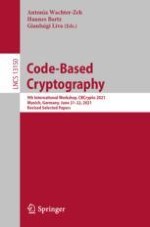2022 | Book
Code-Based Cryptography
9th International Workshop, CBCrypto 2021 Munich, Germany, June 21–22, 2021 Revised Selected Papers
Editors: Prof. Dr. Antonia Wachter-Zeh, Hannes Bartz, Dr. Gianluigi Liva
Publisher: Springer International Publishing
Book Series : Lecture Notes in Computer Science
